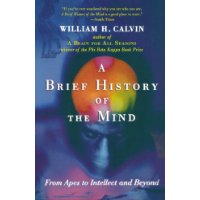| 商家名称 |
信用等级 |
购买信息 |
订购本书 |
|
|
 |
A Brief History of the Mind: From Apes to Intellect and Beyond |
 |
|
 |
A Brief History of the Mind: From Apes to Intellect and Beyond |
 |

基本信息·出版社:Oxford University Press, USA
·页码:240 页
·出版日期:2005年10月
·ISBN:0195182480
·International Standard Book Number:0195182480
·条形码:9780195182484
·EAN:9780195182484
·装帧:平装
·正文语种:英语
内容简介 This book looks back at the simpler versions of mental life in apes, Neanderthals, and our ancestors, back before our burst of creativity started 50,000 years ago. When you can't think about the future in much detail, you are trapped in a here-and-now existence with no "What if?" and "Why me?" William H. Calvin takes stock of what we have now and then explains why we are nearing a crossroads, where mind shifts gears again. The mind's big bang came long after our brain size stopped enlarging. Calvin suggests that the development of long sentences--what modern children do in their third year--was the most likely trigger. To keep a half-dozen concepts from blending together like a summer drink, you need some mental structuring. In saying "I think I saw him leave to go home," you are nesting three sentences inside a fourth. We also structure plans, play games with rules, create structured music and chains of logic, and have a fascination with discovering how things hang together. Our long train of connected thoughts is why our consciousness is so different from what came before. Where does mind go from here, its powers extended by science-enhanced education but with its slowly evolving gut instincts still firmly anchored in the ice ages? We will likely shift gears again, juggling more concepts and making decisions even faster, imagining courses of action in greater depth. Ethics are possible only because of a human level of ability to speculate, judge quality, and modify our possible actions accordingly. Though science increasingly serves as our headlights, we are out driving them, going faster than we can react effectively.
作者简介 William H. Calvin is a neurobiologist at the University of Washington in Seattle who wanders regularly into anthropology, evolution, and climate change. He is the author of
A Brain for All Seasons, which won the Phi Beta Kappa 2002 Book Award for contributions to literature by scientists.
媒体推荐 "Calvin's history will stretch your mind.... The Seattle scientist writes in a conversational style, often referring to 'stuff.' But it's high-level stuff with surprising insights."--
Associated Press It is hard to imagine a subject of more fundamental interest to human beings. If you've ever wondered why you are who you are, 'A Brief History of the Mind' is a good place to start."--
Seattle Times Acclaim for previous books by William Calvin"There is something dizzying about William Calvin's books. Enormous erudition is displayed, with an effortless artistry that blends idiosyncrasy and digression with wit, insight, and dramatic impact. He mixes very difficult and momentous topics with simple momentary observations, placing his enormous subjects into a personal, humanistic, and conversational perspective. --
Virginia Quarterly Review, on
A Brain for All Seasons"Calvin is a member of that rare breed of scientists who can translate the arcana of their fields into lay language, and he's one of the best." --Marcia Bartusiak,
New York Times Book Review"Thinking along with Calvin is sheer delight." --Daniel Dennett, on
The Cerebral Symphony"Calvin writes with clarity and elegance about the brain. In an age when brain science is becoming increasingly fragmented and specialized, Calvin is a rara avis." --V. S. Ramachandran, on
The Cerebral Code"As always, the author's erudition demands close attention but makes science entertaining and accessible for the layman."--
Kirkus Reviews




